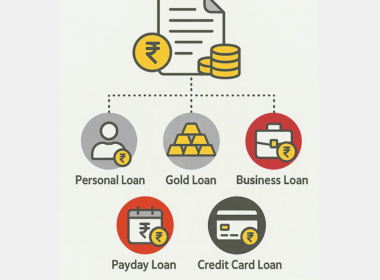Search Suggestions
- Gold Loan
- Money Transfer
- Mutual Funds

Future of SME Loan: Trends and Innovations
SME loans, also known as Small and Medium-sized Enterprise loans, is a financing option designed to provide funding to small and medium-sized businesses. In India, these loans are often referred to as MSME loans, which stand for Micro, Small, and Medium Enterprises loans, reflecting the inclusion of micro-enterprises within the broader SME category.
Table of Content
The SME sector is the backbone of the Indian economy, having made a substantial contribution to the country's GDP, driven by many job opportunities. In fact, in FY 2022, close to 93,94,478 workers were employed in this sector.
Seeing this growing importance of SMEs, understanding the future of SME loans is essential for business owners, investors, and financial advisors. To help you, we will devolve into the latest trends and innovations that will influence the future of SME financing. But first, let's understand the current state of SME financing in India.
Current State of SME Financing in India
Despite playing a big role in India's GDP and employment growth, SMEs face a significant challenge in accessing funding, with financial institutions fulfilling only a fraction of total credit requirements. According to the BLinC Invest MSME Lending Report 2022, financial institutions in India are only able to fulfil 15% of the total credit requirements of the sector.
Additionally, a staggering 99.7% of small businesses operate in the unorganized sector, with many not registered under government authorities. This lack of formal recognition makes it difficult for them to qualify for MSME loan eligibility from banks and non-banking financial companies (NBFCs). This scenario is further compounded by the absence of collateral among small businesses, making them appear to be at high risk for SME funding.
Emerging Trends and Innovations in SME Financing
Here are some emerging trends and innovations in SME financing that you should be aware of:
Collaboration between Fintech and Financial Institutions
The increasing demand for digitalization and online transactions has urged banks and NBFCs to collaborate with online fintech service providers. This collaboration between financing institutions and fintech companies will help streamline SME loan disbursal through innovative financial products.
Significant Emphasis on Automation
Automation is going to play a significant role in the future of SME financing. The advances in AI and machine learning are set to streamline and significantly simplify the lending process. The digitally verifiable data about potential borrowers will reduce the need for extensive documentation and expedite the approval process.
Additionally, automation will help lenders minimize resource allocation, leading to reduced operational costs and lower overhead fees for applicants.
Enhancing Security and Transparency with Blockchain
Blockchain technology is going to be a game-changer for SME financing, helping provide a secure and tamper-proof record of transactions. By reducing fraud and enhancing transparency, blockchain technology will help instil greater trust among both lenders and borrowers, creating a more secure lending environment.
Advancement of Neo-Banking Facilities
Neo-banking facilities are financing institutions that are only available online, with no physical branches. These facilities are gaining quite a popularity among small business owners due to their competitive SME interest rates and fewer restrictions policies compared to the traditional banks. Plus they have user-friendly interfaces that enable a wide range of SME businesses to sign up for loans with minimal disbursal time.
Suggested Read: Sme Loan Interest Rates: Everything You Need To Know
Government Initiatives
The Indian government has now started to understand how crucial the micro, small, and medium enterprises (MSME) sector is and has introduced several policies to boost its growth. The government has introduced serval initiatives and programs such as the Pradhan Mantri Mudra Yojana and the Credit Guarantee Fund Trust for Micro and Small Enterprises (CGTMSE), designed to make it easier for SMEs to access financing and help bridge the credit gap.
Alternate Financing Solutions
With the advancement of the Fintech industry, a range of alternative financing solutions have emerged. Some of the financing options that are set to gain traction among SMEs include peer-to-peer lending, invoice discounting, and crowdfunding. These solutions provide small businesses with multiple options to secure the necessary funding for their growth and operation.
Growth of NBFCs
NBFCs or Non-Banking Financing Companies have also seen great growth in recent years and have become major players in the SME financing market by providing flexible loan criteria and quicker processing time compared to traditional banks. These NBFCs also often offer loans to SMEs that do not meet the stringent MSME loan eligibility criteria of conventional banks.
Overall, the rise of MSME loans for new businesses is a testament to the sector's vital role in economic growth. The upcoming trends and innovations indicate an accessible and timely availability of funds which may help entrepreneurs take their businesses to new heights of success.
If you are someone looking to avail of an SME loan, then consider applying for a loan at Muthoot Finance. We offer instant SME financing at competitive interest rates for all your business needs.
CATEGORIES
OUR SERVICES
-

Credit Score
-

Gold Loan
-

Personal Loan
-

Cibil Score
-

Vehicle Loan
-

Small Business Loan
-

Money Transfer
-

Insurance
-

Mutual Funds
-

SME Loan
-

Corporate Loan
-

NCD
-

PAN Card
-

NPS
-

Custom Offers
-

Digital & Cashless
-

Milligram Rewards
-

Bank Mapping
-

Housing Finance
-

#Big Business Loan
-

#Gold Loan Mela
-

#Kholiye Khushiyon Ki Tijori
-

#Gold Loan At Home
-

#Sunherisoch
RECENT POSTS

Understanding KDM Gold and Why it’s Banned
Know More
How BNPL Affects Your Credit Score
Know More
What is a Cheque and its Different Types in India?
Know More
Benefits of Paying Your EMIs on Time: Why Timely Payments Matter
Know More
A Complete Guide to Report Online Fraud
Know More
How does a Personal Loan Affect your Credit Score?
Know More
Gilt Fund vs Liquid Fund: Full Form, Meaning & SIP Guide
Know More
XIRR in Mutual Funds & SIP: Full Form, Meaning, Formula and How to Calculate
Know More
7 Key Factors to Consider Before Taking an SME Loan
Know More
Difference Between Black Gold and Gold: Everything You Need to Know
Know MoreFIN SHORTS

What Are Co-Pay and Deductibles in Insurance Policies?
Know More
Should You Take a Loan Against Your Mutual Fund or SIP?
Know More
Top 5 Best Mid-Cap Mutual Funds to Watch in 2026
Know More
Are Personal Loans Right for Retirees? Key Points to Consider
Know More
What Happens to a Personal Loan After the Borrower Dies?
Know More
Best Loan Choices for Credit Scores of 580 and Below
Know More
7 Reasons Why a Gold Loan Is the Best Option for Small Businesses
Know More
10 Reasons Why People in India Prefer Physical Gold
Know More
Real Estate vs Gold: Which Is a Better Investment in India?
Know More
10 Common Mistakes That Make Investors Lose Money in Mutual Funds
Know More
10 Reasons Why Gold Has So Much Appeal in Uncertain Times
Know More
7 Ways Settling Debt Can Impact Your CIBIL Score
Know More- South +91 99469 01212
- North 1800 313 1212




